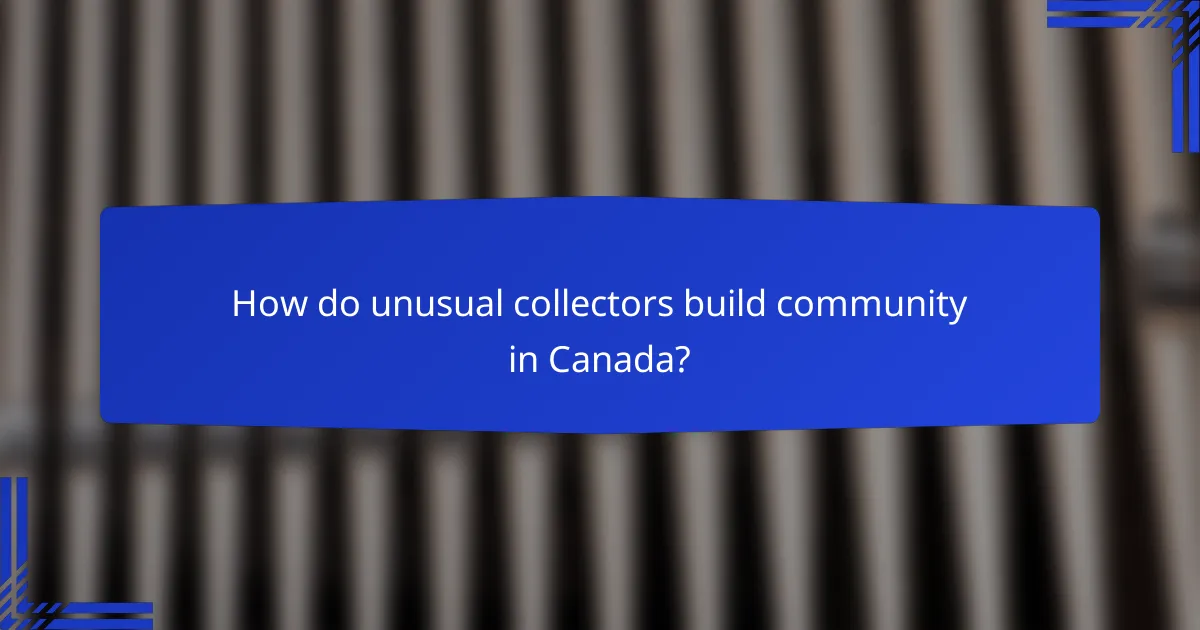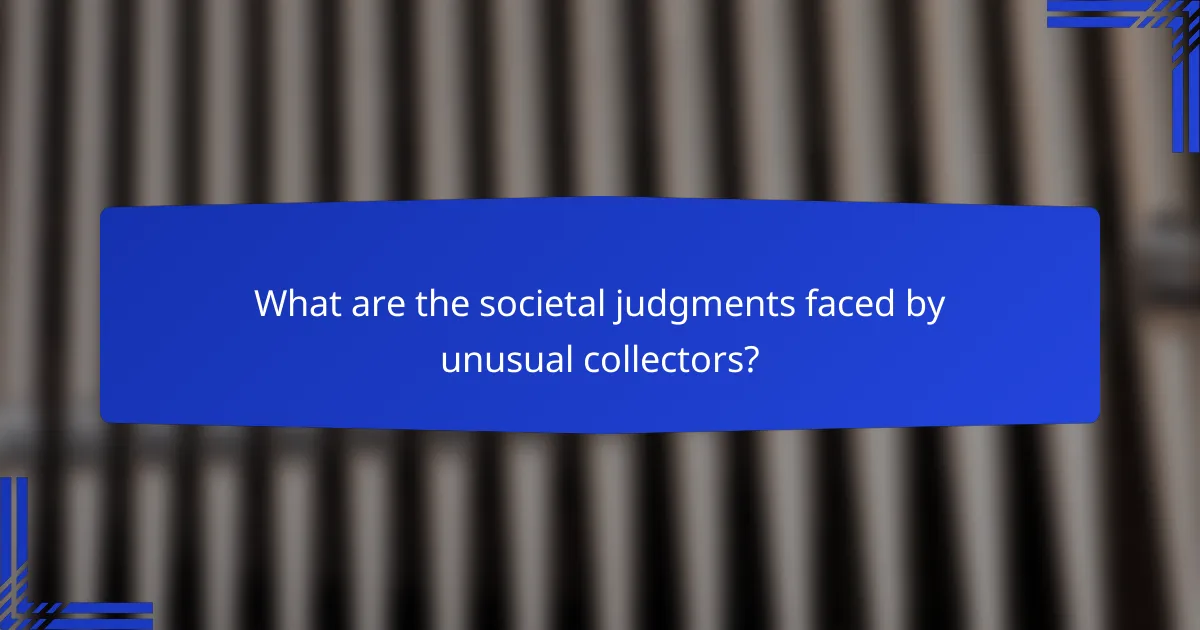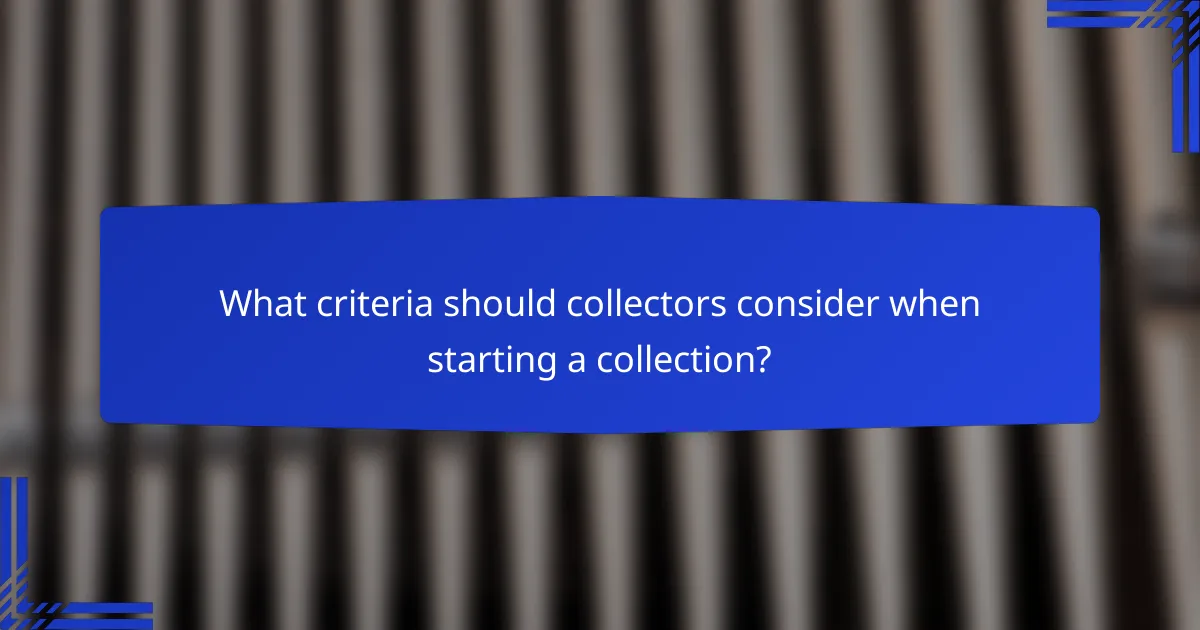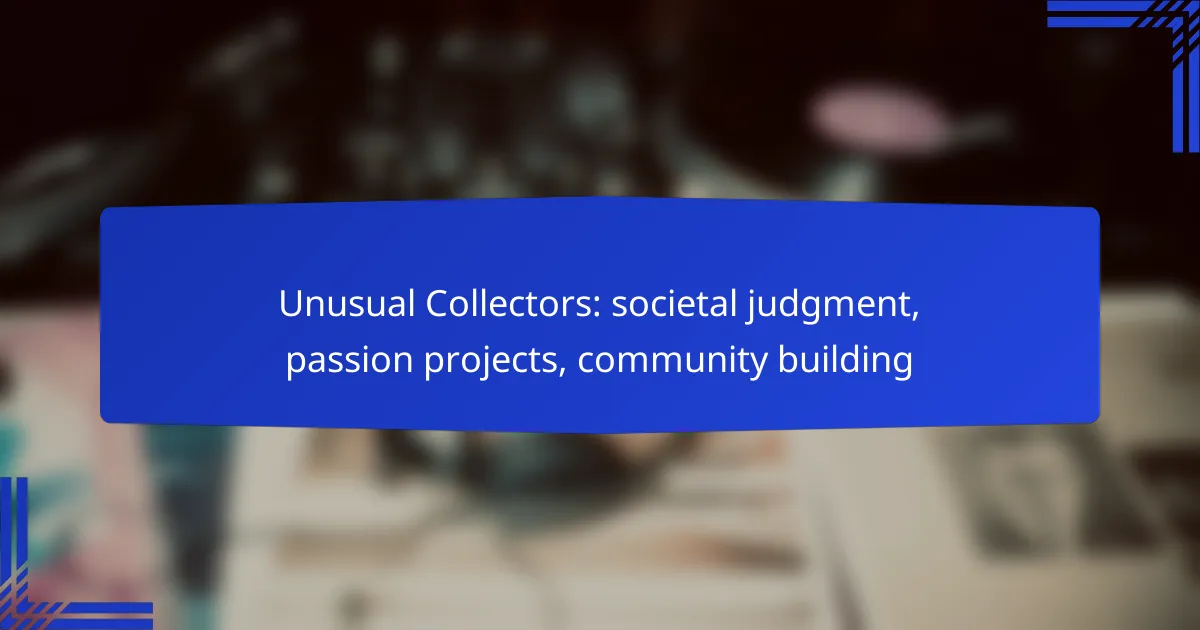Unusual collectors play a vital role in fostering community and connection through their shared passions for unique items. While they often face societal judgments that reflect a lack of understanding, these collectors can turn their interests into profitable ventures by engaging with their audience and exploring innovative ways to monetize their collections.

How do unusual collectors build community in Canada?
Unusual collectors in Canada build community through shared interests, fostering connections among individuals who appreciate unique items. These communities often form around local clubs, online platforms, and events that celebrate their passions.
Local collector clubs
Local collector clubs provide a space for enthusiasts to meet regularly, share their collections, and exchange knowledge. These clubs often focus on specific interests, such as vintage toys, rare coins, or unique art pieces, allowing members to connect over their shared passions.
Joining a local club can enhance the collecting experience by offering access to exclusive events, guest speakers, and workshops. Many clubs also organize swap meets, where members can trade items, further enriching their collections.
Online forums and social media groups
Online forums and social media groups serve as virtual meeting places for collectors across Canada. These platforms allow members to share photos, discuss trends, and seek advice from fellow enthusiasts, regardless of geographical barriers.
Platforms like Facebook, Reddit, and specialized collector websites often host discussions where users can ask questions, showcase their collections, and participate in themed challenges. Engaging in these online communities can lead to valuable connections and insights into the collecting world.
Community events and exhibitions
Community events and exhibitions play a crucial role in bringing collectors together. These gatherings often feature displays of unique collections, allowing attendees to appreciate the diversity of interests within the community.
Events such as trade shows, flea markets, and local fairs provide opportunities for collectors to buy, sell, and trade items while networking with others. Participating in these events can help collectors gain visibility and find new items to enhance their collections.

What are the societal judgments faced by unusual collectors?
Unusual collectors often encounter societal judgments that can range from mild curiosity to outright disdain. These judgments stem from a lack of understanding and acceptance of niche interests, which can lead to stigmatization and skewed perceptions of value.
Stigmatization of niche interests
Niche interests, such as collecting vintage toys or rare stamps, can be stigmatized as frivolous or eccentric. This stigma often arises from societal norms that prioritize mainstream hobbies and interests, leading to feelings of isolation among collectors.
Collectors may face ridicule or skepticism from peers, which can discourage them from sharing their passions. To combat this, joining online forums or local clubs can provide a supportive community that appreciates these unique interests.
Perceptions of value and worth
The value of unusual collections is often misunderstood, with many people equating worth solely with monetary value. Collectors might find that their items hold significant personal or historical value that isn’t reflected in market prices.
For instance, a collection of vintage postcards may not fetch high prices but could represent cherished memories or cultural heritage. Collectors should focus on what their collections mean to them and seek out communities that recognize and celebrate these intrinsic values.

How can unusual collectors turn passion projects into profitable ventures?
Unusual collectors can transform their passion projects into profitable ventures by leveraging their unique collections for sales, content creation, and experiential offerings. By understanding their audience and market, collectors can monetize their interests effectively.
Monetizing collections through sales
Collectors can sell items from their collections through various platforms, including online marketplaces, auctions, or specialized shops. Pricing should reflect the rarity and demand for the items, often ranging from low tens of dollars for common pieces to thousands for rare finds.
Consider hosting pop-up sales or participating in local fairs to reach potential buyers directly. Building a strong online presence through social media can also attract interest and drive sales.
Creating content around collections
Creating engaging content related to collections can attract a dedicated audience and generate revenue through ads or sponsorships. This could include blogs, YouTube channels, or podcasts that showcase the collection’s story, history, and significance.
Collectors should focus on high-quality visuals and storytelling to connect with viewers. Regularly updating content and engaging with the audience can help build a loyal following, which can be monetized over time.
Offering workshops and experiences
Collectors can offer workshops or experiences that allow others to learn about their collections. This could involve guided tours, hands-on sessions, or educational classes that share knowledge about collecting, preservation, or specific items.
Pricing for these experiences can vary widely, from affordable group sessions to premium one-on-one consultations. Collaborating with local venues or community centers can also enhance visibility and attract participants.

What are the psychological benefits of collecting unusual items?
Collecting unusual items can provide significant psychological benefits, including enhanced self-identity and improved mental well-being. Engaging in this passion project fosters connections with others and offers a unique outlet for creativity and personal expression.
Sense of identity and belonging
Collecting unusual items often helps individuals develop a stronger sense of identity. When collectors immerse themselves in their interests, they create a personal narrative that reflects their values and passions. This connection can lead to a feeling of belonging within niche communities that share similar interests.
Participating in collector groups, whether online or in-person, allows individuals to connect with like-minded enthusiasts. These interactions can reinforce social bonds and provide a supportive environment where members share knowledge, trade items, and celebrate their collections.
Stress relief and mental stimulation
Engaging in the act of collecting can serve as a form of stress relief, providing a welcome distraction from daily pressures. The focus required to seek out, organize, and maintain a collection can shift attention away from stressors, promoting relaxation and enjoyment.
Additionally, collecting unusual items stimulates mental activity by encouraging research, problem-solving, and critical thinking. Collectors often explore the history, value, and significance of their items, which can enhance cognitive skills and provide a sense of accomplishment.

What criteria should collectors consider when starting a collection?
Collectors should consider their personal interests, market trends, and potential value when starting a collection. Balancing passion with practical considerations can lead to a fulfilling and potentially profitable endeavor.
Personal interest and passion
Personal interest is crucial for any collector. A genuine passion for the items being collected will sustain motivation over time, especially during challenges such as market fluctuations or difficulty in sourcing items. For example, someone who loves vintage vinyl records will likely enjoy the hunt for rare albums much more than someone collecting solely for investment purposes.
When starting a collection, think about what truly excites you. This could be anything from stamps, coins, or comic books to more niche items like vintage toys or art. The key is to focus on areas that resonate with you personally, as this will enhance your collecting experience and foster a deeper connection to your collection.
Market trends and value
Understanding market trends is essential for collectors who want to ensure their collection retains or increases in value. Research current demand for specific items, as well as historical price trends, to make informed decisions. For instance, collectibles like rare coins or limited-edition sneakers often have fluctuating values based on popularity and scarcity.
Keep an eye on auction results and collector forums to gauge what items are currently sought after. Additionally, consider the condition and provenance of items, as these factors can significantly impact their market value. It’s wise to avoid overpaying for items that may not appreciate in value or are easily replicated.

How do unusual collections influence cultural trends in Canada?
Unusual collections in Canada significantly shape cultural trends by fostering unique communities and driving niche markets. These collections often reflect personal passions that resonate with broader societal interests, influencing everything from consumer behavior to artistic expression.
Shaping niche markets
Unusual collections create niche markets by attracting enthusiasts who are willing to spend on rare items. For instance, collectors of vintage Canadian postcards or indigenous art can drive demand for specific products, leading to specialized shops and online marketplaces. This phenomenon encourages local artisans and businesses to cater to these unique interests, often resulting in a diverse range of offerings.
As these niche markets grow, they can also inspire collaborations between collectors and creators, leading to limited-edition releases or events that celebrate these collections. Such initiatives not only support local economies but also enhance community engagement around shared passions.
Impact on mainstream culture
The influence of unusual collections extends into mainstream culture as they challenge conventional norms and spark new trends. For example, the rise of collecting items like retro video games or unique vinyl records has led to a resurgence in interest in vintage aesthetics and analog experiences. This shift can be seen in fashion, music, and even home décor, where retro elements become popular.
Moreover, media coverage of unusual collections often brings them into the public eye, normalizing these interests and encouraging others to explore similar hobbies. This cultural acceptance can lead to larger events, such as conventions or exhibitions, which further integrate these collections into the fabric of Canadian society.
